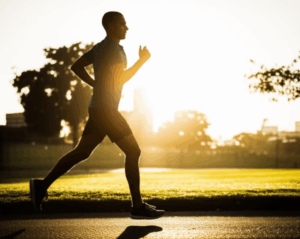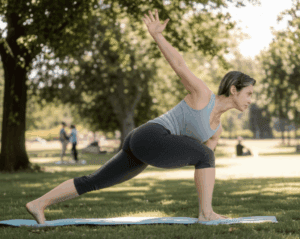Exercise and sleep: they’re like two peas in a pod when it comes to a healthy lifestyle. You probably already know that working out is good for you, but did you realize it can also help you sleep better? And on the flip side, getting enough quality sleep can seriously boost your fitness routine. Let’s dive into how these two powerhouses work together to keep you feeling your best.
Why Exercise Helps You Sleep
Getting regular physical activity isn’t just about building muscle or shedding pounds; it can also be a game-changer for your sleep. Here’s the lowdown on how exercise can improve your sleep quality:
- Regulates your circadian rhythm: Exercise helps to sync your body’s natural sleep-wake cycle, making it easier to fall asleep and wake up at consistent times.
- Reduces stress and anxiety: Working out is a fantastic stress reliever. By reducing feelings of stress and anxiety, exercise can calm your mind and make it easier to drift off to sleep.
- Builds sleep pressure: Physical activity can increase your body’s need for sleep, also known as homeostatic sleep drive. This means you’ll feel sleepier at bedtime and be less likely to spend hours tossing and turning.
- Alters body temperature: Exercise raises your core body temperature. As your body temperature starts to fall after your workout, it signals to your brain that it’s time to sleep.
- Releases endorphins: Exercise triggers the release of endorphins, which can alleviate pain and induce feelings of pleasure, potentially limiting sleep quality disturbances.
Multiple studies have shown that regular physical activity can improve sleep quality and duration. Adults who engage in at least 30 minutes of exercise a day tend to sleep longer and experience fewer sleep disturbances. Exercise has also shown promise in managing sleep disorders like insomnia, reducing sleep latency (the time it takes to fall asleep), and decreasing the amount of time spent awake in bed during the night.
Finding the Right Exercise
Not all exercise is created equal when it comes to sleep. Here are some types of physical activity that research suggests may be particularly beneficial:
- Aerobic exercise: Activities like running, swimming, and cycling can improve sleep depth and reduce sleep onset latency.
- Strength training: Lifting weights, using resistance bands, or doing bodyweight exercises can also facilitate improved sleep, especially when combined with aerobic exercise.
- Mind-body exercises: Practices like yoga, tai chi, and qigong may improve sleep outcomes and decrease insomnia.
Timing Matters
When you exercise can be just as important as how you exercise. While some people can workout close to bedtime without any issues, others find that it disrupts their sleep. Here are a few things to keep in mind:
- Avoid intense workouts close to bedtime: Vigorous cardio workouts can raise your body temperature and heart rate, making it harder to fall asleep. Try to finish your workout at least one to two hours before going to sleep.
- Consider morning exercise: Working out in the morning may help you sleep longer at night. Morning exercise can also help set your circadian rhythm by exposing you to bright sunlight.
- Listen to your body: Pay attention to how your body responds to exercise at different times of the day and adjust your schedule accordingly.
Why Sleep is Good for Your Fitness Routine
Just as exercise benefits your sleep, getting enough quality sleep is essential for maximizing your fitness efforts. Here’s how sleep can improve your workouts and overall fitness:
- Fuels muscle recovery: Sleep is when your muscles repair and rebuild. During deep sleep, your body releases growth hormones that are essential for muscle repair and regeneration.
- Replenishes energy stores: During sleep, your body restores glycogen, the primary energy source for your muscles. Adequate glycogen stores ensure optimal muscle function and performance during subsequent workouts or activities.
- Reduces inflammation: Exercise can cause inflammation in the muscles. Adequate sleep helps to reduce inflammation by modulating the body’s immune response, promoting faster recovery.
- Regulates hormones: Sleep plays a crucial role in regulating hormone levels, including growth hormone and cortisol. Maintaining a healthy balance of these hormones is essential for muscle recovery and growth.
- Boosts workout performance: Adequate sleep directly impacts stamina, strength, reaction time, and coordination. Studies have shown that athletes who get enough sleep perform better in endurance, strength, and high-intensity training.
- Enhances mental focus: Sleep helps with focus, allowing you to stay mentally engaged during workouts. It also improves cognitive function, including attention, reaction time, and decision-making.
- Lowers stress: Poor sleep increases cortisol levels, which can lead to muscle breakdown and reduced motivation to exercise. Quality sleep lowers cortisol levels, improving focus and enhancing mental clarity.
- Controls hunger hormones: Sleep helps regulate appetite by controlling the levels of ghrelin and leptin, two key hormones that control hunger and fullness signals in the body.
The Impact of Sleep Deprivation
Skimping on sleep can have a significant negative impact on your fitness routine. Here’s what can happen when you don’t get enough rest:
- Decreased performance: Sleep deprivation can reduce explosive power, maximum power, speed performance, motor control, and aerobic endurance.
- Increased perceived exertion: When you’re sleep-deprived, exercise feels harder. You may also reach exhaustion faster.
- Reduced muscle strength and endurance: Without adequate sleep, your body may not have enough time to repair and rebuild muscle tissue, leading to decreased muscle strength and endurance.
- Impaired cognitive function: Lack of sleep can impair cognitive function, making it harder to make decisions and adapt to new situations.
- Increased risk of injury: Sleep deprivation is linked with an increased risk of sports injuries. Fatigue, low energy, and poor focus can make you more susceptible to accidents.
How Much Sleep Do You Need?
Most adults need between seven to nine hours of sleep each night. However, the ideal amount of sleep can vary depending on individual factors like age, activity level, and overall health. Athletes and those who engage in intense training may need even more sleep to support muscle recovery and optimal performance.
Tips for Better Sleep
If you’re struggling to get enough quality sleep, here are some tips to help you improve your sleep habits:
- Stick to a schedule: Go to bed and wake up at the same time every day, even on weekends.
- Create a relaxing bedtime routine: Take a warm bath, read a book, or listen to calming music before bed.
- Make your bedroom a sleep sanctuary: Keep your bedroom cool, dark, and quiet.
- Avoid screens before bed: The blue light emitted from electronic devices can interfere with sleep.
- Limit caffeine and alcohol: Avoid caffeine and alcohol close to bedtime.
- Get regular exercise: Aim for at least 30 minutes of moderate-intensity exercise most days of the week, but avoid intense workouts close to bedtime.
- Get natural light: Expose yourself to natural light during the day, especially in the morning.
- Manage stress: Practice relaxation techniques like meditation or deep breathing to manage stress.
- Consider a sleep aid: If you’re still struggling to sleep, talk to your doctor about over-the-counter or prescription sleep aids.
The Bottom Line
Exercise and sleep are both essential components of a healthy lifestyle. By understanding how these two factors influence each other, you can optimize your fitness routine and improve your overall well-being. Make sleep a priority, find an exercise routine that you enjoy, and listen to your body. With consistency and dedication, you’ll be well on your way to achieving your fitness goals and enjoying a happier, healthier life.







